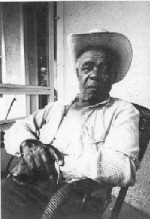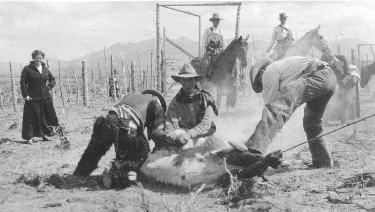HOWARD
HICKSON'S HISTORIES
[Index]
Black Wrangler
- Part Three
Reminiscences of Lawrence Jackson
Edited by Howard Hickson
 Photograph
of Lawrence Jackson by Jonas Dovydenas, Lenox, Massachusetts. With
his permission. Photograph
of Lawrence Jackson by Jonas Dovydenas, Lenox, Massachusetts. With
his permission.
MUSTANGS
I said mustangs was sensitive. They always
had a guard or lookout on duty, usually the head stud. When he gave out
a loud snort, or shrill whistle, the heard took off with one of the older
mares leading. The stallion stayed behind, nipping at stragglers to see
that they all get going.
The mustang is the symbol of the Old West.
The pioneers, ranchers and cowmen built up their herds with wild horses.
A lot of them was worthless, but some made good saddle horses that could
carry a man all day. It is a hardy animal to live on the desert summer
and winter, sometimes short on grass and water. But, poor or fat, they
was always ready to put up a good run. I have watched mustangs going to
water. Some of the mares would have little wobbly-legged colts, only two
or three days old. The water hole might be eight or ten miles away, but
that didn't matter. They would start off in a trot for a mile or two then
swing into a gallop all the way. Them little colts would get up close to
their mothers, sorta lean against their shoulders, and run right along
with the herd.
PRIDE OF BUTTON LAKE
On the desert there is a big lake called Button
Lake, named after an old pioneer, I.V. Button. A pretty little brown stud
watered there. When he shed off he was slick and shiny as a seal. He had
four white feet, a wide white stripe on his forehead, and a long mane and
tail. It was a thrill to watch him run, gaining on every jump. It looked
like he was floating on air.
He was called the "Pride of Button Lake."
We couldn't catch him, even with a relay. When a horse gets away a time
or two it usually runs the same trail - then you know his habit. Three
or four wranglers on good horses hide along the trail, three or four miles
apart. When the stud makes his break, the first man takes him on a dead
run to the second man that chases him on to the third fellow, and so on
until the mustang tires out. That's a relay. I worked for Gorham for four
years and when I left that part of the country the "Pride of Button Lake"
was still running free. That's just as well. When a horse is run until
he quits he is busted, wind-broke and worthless.

Branding on the Spanish Ranch. Photo from
the Northeastern Nevada Museum, Elko.
MURDER ON THE DESERT
We was camped on the Little Owyhee at Mahogany
Flat, above where Doc and me tried to build the dam.
In the daytime the horses never gave much
trouble, but at night and early morning was when I was the busiest. One
day, I heard Doc was back and, as I had lots of time, thought I might as
well drop in on him. He was waiting for Harvey Sewell to find out what
he was going to do about the dynamited dam.
We got to talking and Doc said, "Jack, you
know where that old rock corral is, and the remains of that rock house
up the creek aways? Well, about a week ago, an old Indian came by with
a young kid. He said the boy had run away from the McDermitt school and
made his way back to the Owyhee reservation. That's over a hundred miles,
in a wild country, on foot. The old fellow was with the Indian police and
was taking the kid back to school."
Doc had some whiskey and gave the old man
a drink or two. This loosened his tongue and got him to talking. He told
Doc that there was seven Chinamen buried in a grave in the east corner
of the old rock house.
He continued, saying that 60 or 70 years ago,
the Chinamen left Silver City, Idaho, with two wagons and $50,000, or more,
in gold they had mined. They crossed the river at Duncan's Ferry and came
this way, headed for Winnemucca. Nobody ever saw them again. Some figured
it was Indians, but it was five white men that trailed them from Silver
City that did it.
Doc took me out to a blacksmith shed to show
me what he had dug up at the rock ruins. On a shelf was three skulls, pieces
of some more, and bones that was, without a doubt, human. About that time,
I thought I better get back to camp and told Doc that the horses might
be rambling. They never gave me any trouble but, just in case, I got back.
That old desert holds a lot of secrets.
RUSTLERS
Clyde Wiley had a small outfit on the East
Fork of the Owyhee. He had some good horses and few cows. He was just getting
started. He had to work part-time for other ranchers to make ends meet.
At the time, Taylor and Reed was paying him to look after some horses they
had on the desert.
A man named McCoy lived on the desert and
had two sons. They seldom worked. Clyde missed some horses and trailed
them to the McCoy herd and found some of them in the bunch. Clyde had the
old and the youngest son arrested. The oldest boy, Archie, wasn't with
them. They was convicted and got 2 to 14 years in the pen. That old man
and his son was fortunate. Back then, most trials for horse stealing was
held under a tree or high gate post.
The older boy said he would get even with
Clyde. The local stockmen gave the boy time to gather when few cattle and
horses he had and ordered him to leave the country, warning him never to
come back.
One evening, Clyde was unsaddling his horse
and was taking off the bridle when a bullet grazed his shoulder, hit the
horse in the head and killed it. The only protection Clyde had was behind
that dead horse. Every time he exposed hisself somebody would take a shot
at him from the rimrock. He laid behind the horse until dark, then crawled
away. It might not have been the older McCoy boy, but Clyde put in a lot
of time hunting for him.
CHASING RUNAWAY HORSES
We had no fenced pastures. I always took the
horses out after supper and herded them 'til dark, then hit them again
at daylight. Most stock start to wander around sunrise.
One night the moon was bright as day and I
expected trouble. In the morning, I left camp earlier than usual and, sure
enough, they was scattered far and wide. I counted them and came up 14
short.
Gorham told me we needed those horses and
I was to eat breakfast, then saddle up Rowdy. I thought I heard wrong.
Rowdy was Gorham's private mount. I always admired that horse and never
expected to get my saddle on him. He was a tall, long-legged bay built
for traveling.
I said, "Did you say Rowdy?"
"Yes, no telling how far you have to go, so
you need a good horse."
Sometimes I lost their trail, but would swing
back and forth until I found tracks again. I followed them all day across
that hot desert. About an hour before sundown I was on a high rimrock and
spotted the horses. They saw me at the same time and took off running.
There was only one trail off the rim and I knowed if they beat me there
that I would lose them in the dark. Rowdy had enough to outrun them
About a mile back was a guard corral, so I
took the horses there and tied the gate shut. By then it was sundown. Me
and Rowdy was both tired. We had come 65 miles that day. Back of the corral
was a rocky draw where I unsaddled Rowdy. I let him have about half as
much water as he needed, then tied him to the fence to cool off. I built
a fire and ate half my lunch. By that time the horse had cooled off and
I turned him loose to roll and graze. I knowed he wouldn't want to leave
as long as the other horses was in the corral.
The desert gets awful hot in the day, but
after sundown it gets cold. All I had was a thin, unlined denim jacket.
I tried to get some sleep, but all I had for cover was a sweaty saddle
blanket and the odor was just too much. I had fitful night. Coyotes serenaded
all night and, ever now and then, a cougar would squall. Sounded something
like a woman screaming. It made cold shivers run up and down my spine.
I thought morning would never come.
At the crack of day, I ate the rest of my
lunch and drank what water I had left. I caught a black horse, called Brown
Jug, and started back. I didn't make good time because the horses didn't
want to go back to camp. It was a chore just to keep awake. Twice I fell
asleep and woke up just in time to keep from falling off my horse. I was
real sleepy, but my biggest concern was lack of water. I found some water,
but the horses wouldn't drink it. I had been told that if a horse you know
is dry and won't drink the water, then don't drink it either.
About sundown, I saw I wasn't going to make
it back to camp before dark. It wasn't far, but I didn't want to lose the
horses in the dark. Just ahead, on Willow Creek, was a homestead where
two old bachelors, Andy Merrit and Bill St. Clair, was staying. I put the
horses in a field and went to the house. Nobody was home. Didn't look like
they had been around for quite a spell.
But, the custom is, make yourself at home,
be sure to wash the dishes, and shut the gate when you go out. I was hungry,
but the rats and mice had ate just about everything edible. I did find
some canned tomatoes and a tin box with some cheese in it. A blanket, quilt
and mattress was hanging on a wire from the rafters to keep the rodents
out of it. Had to keep a lamp lit all night to keep the mice off the bed.
The next morning, I caught a bay horse, named
Spot, and got to camp just as the crew was having breakfast. Gorham told
me had about given me up. The day before, he had two men out looking for
me and was planning to go out again. Said he was glad I made it and got
the horses, too.
Next: Jackson tells about a young man who was beaten, the sad
story of a young black cowhand, camp retribution, squatters, and Napoleon
(a mule).
©Copyright 2000 by Howard Hickson. If any portion
or all of this article is used or quoted proper credit must be given to
the author.
[Back to Hickson's Histories Index]
|

 Photograph
of Lawrence Jackson by Jonas Dovydenas, Lenox, Massachusetts. With
his permission.
Photograph
of Lawrence Jackson by Jonas Dovydenas, Lenox, Massachusetts. With
his permission.